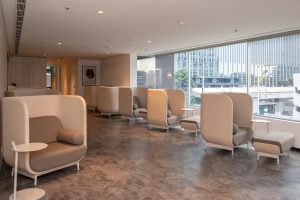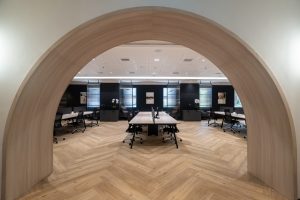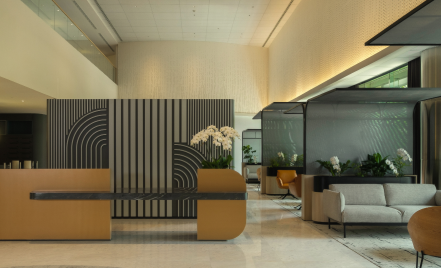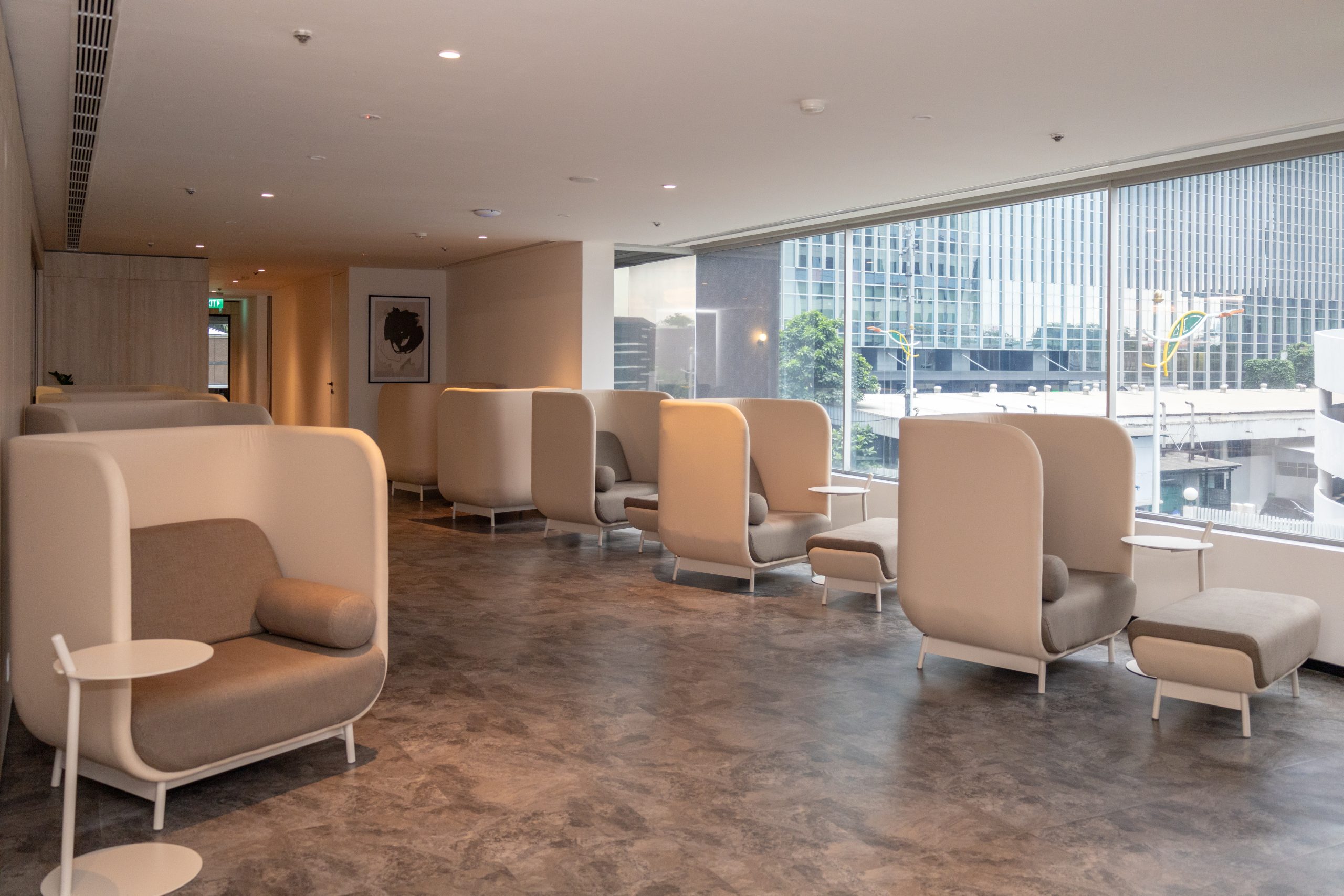Choosing the right workspace is crucial for productivity and employee satisfaction. The debate between private office vs open space revolves around privacy, collaboration, and cost. Private offices offer focus and confidentiality, while open spaces foster teamwork and flexibility. Discover which environment aligns with your business needs and work style through this article.

What is Private Office?
A private office is a dedicated, lockable workspace within a shared facility, offering privacy and focus. Compared to open spaces, it provides fewer distractions and more control. Fully furnished with desks and ergonomic seating, it balances confidentiality with networking opportunities, making it ideal for businesses of all sizes.
Advantages of Private Offices
Private offices offer numerous benefits, making them an excellent choice for businesses seeking flexibility, security, productivity, cost efficiency, and a healthier work environment. Here are private office advantages:
1. Flexibility and Growth Opportunity
Unlike rigid traditional leases, private offices offer short-term rental options, allowing businesses to scale up or down as needed. This is ideal for startups, project-based teams, or companies experiencing rapid growth, ensuring efficient resource allocation without long-term financial commitments.
2. Privacy and Security in a Flexible Workspace
A private office ensures confidentiality, making it ideal for handling legal, financial, or HR matters. Access is restricted to authorized personnel, allowing for secure data storage and undisturbed meetings. Even within a shared workspace, businesses can maintain control over their environment while benefiting from networking opportunities.
3. Enhance Productivity and Promote Collaboration
Private offices minimize distractions, enabling employees to focus on tasks without background noise. They also provide a professional setting for video calls and client meetings. While fostering independence, these spaces still allow interaction with the larger coworking community when needed.
4. Cost Efficient
Businesses save on overhead costs like furniture, utilities, and maintenance. Shared amenities such as meeting rooms, high-speed internet, and office supplies reduce expenses, offering a “pay-as-you-go” model that maximizes budget efficiency.
5. Better Health within a Shared Office Facility
Many coworking spaces with private offices offer wellness perks like gyms, relaxation zones, and healthy snacks. A well-designed office environment enhances employee well-being, leading to improved productivity and job satisfaction.
Disadvantages of Private Offices
While private offices offer privacy and exclusivity, they also come with significant drawbacks that businesses should consider. Here are 3 major disadvantages of private office spaces:
1. Higher Construction and Maintenance Costs
Private offices require additional infrastructure like walls, doors, and soundproofing, leading to high construction costs. Maintenance expenses also increase due to furniture, office supplies, and utilities. These costs can be a burden for startups and small businesses, limiting their ability to invest in growth and innovation.
2. Limited Space Utilization and Scalability
Compared to open-plan offices, private offices take up more space, leading to inefficient utilization. Walls and partitions reduce the number of available workstations, making expansion or downsizing more challenging. Rigid layouts and fixed leases further restrict scalability, whereas open offices allow businesses to adapt more flexibly.
3. Potential for Employee Isolation
Private offices can limit interaction among employees, reducing spontaneous collaboration and teamwork. This isolation may impact company culture, job satisfaction, and innovation. To mitigate this, businesses should implement strategies like regular team meetings and social activities to maintain communication and engagement while preserving privacy benefits.
What is Open Space?

Open space is a workplace design that removes walls and cubicles, creating a collaborative and flexible environment. It promotes interaction, teamwork, and a dynamic office culture, enhancing creativity.
Compared to private offices, it may lack privacy but is perfect for fostering innovation. You can look for open space for rent to save on budget and provide a cost-effective, yet creative space for your team to thrive.
Advantages of Open Space
When considering private office vs open space, many companies opt for open layouts due to their numerous benefits. Here are three key advantages of open office spaces:
1. Enhanced Collaboration and Communication
Without physical barriers, employees can easily communicate, share ideas, and collaborate on projects. This setup fosters teamwork and encourages a more dynamic workflow.
2. Cost-Efficient Space Utilization
Open offices maximize available space, allowing businesses to accommodate more employees without expanding office areas. This leads to lower real estate costs and greater flexibility in workspace arrangements.
3. Improved Company Culture
A shared workspace strengthens relationships, promotes transparency, and creates a more connected work environment. Employees feel more engaged, leading to higher morale and productivity.
Disadvantages of Open Space
The debate between private office vs open space is ongoing, and while open office layouts are designed to foster collaboration, they come with several drawbacks. Here are some of the disadvantages of open spaces:
1. Noise and Distractions
Open offices often suffer from high noise levels due to the constant activity and conversations happening around employees. This makes it difficult for workers to concentrate, especially on tasks that require focus, such as phone calls or deep thinking. A survey revealed that 99% of participants found their surroundings distracting, with noise being a major issue for many.
2. Limited Privacy
In an open office, privacy becomes a significant concern. Without partitions or private spaces, sensitive discussions and confidential tasks are harder to manage. Employees who are used to private offices may feel uncomfortable or exposed, which can impact their overall work experience.
3. Reduced Productivity for Some Work Styles
For some employees, the open layout can lead to decreased productivity. Constant interruptions, lack of personal space, and the inability to focus on tasks can lead to dissatisfaction and stress, ultimately affecting their work output.
How to Decide Between a Private Office and an Open Space

When deciding between a private office vs open space, it’s essential to consider the specific needs of your business and employees. Here are a few factors to help guide your decision:
1. Nature of Work
Some tasks require concentration and minimal interruptions, making a private office the ideal choice. Jobs in finance, legal sectors, or R&D benefit from the privacy of personal workspaces. In contrast, roles focused on collaboration, like sales or marketing, thrive in open spaces that encourage interaction.
2. Employee Preferences
Employees have different working styles. Introverted individuals may prefer a private office for quiet focus, while extroverted employees may enjoy the social aspect of an open space. Understanding your team’s preferences ensures a comfortable, productive environment.
3. Budget Considerations
Open offices tend to be more cost-effective due to shared resources and fewer walls. However, if privacy and focus are critical, private offices may be worth the investment.
Why Choose Flow’s Private Office Services

When choosing between a shared workspace or a dedicated office, private office vs open space debates often focus on comfort, productivity, and flexibility. Flow’s Private Office Services provide an exceptional solution for professionals and teams seeking a refined, fully equipped workspace in Jakarta’s vibrant core.
If you’re considering a private office for rent, Flow’s spaces are designed with AYANA’s signature five-star hospitality, offering spacious, light-filled environments that blend luxury with functionality. These suites accommodate teams of up to 12, featuring ergonomic furniture, high-performance workstations, and flexible layouts. Members also gain access to dynamic communal spaces, a quiet lounge, gigabit-speed Wi-Fi, and premium amenities.
Beyond private offices, Flow provides various workspace solutions:
- Flexible Desk: Perfect for those who thrive in a vibrant, ever-changing environment.
- Day Pass: Full-day access to Flow’s luxurious workspace with no commitments.
- Meeting Rooms: Soundproof, tech-enhanced spaces for seamless collaboration.
- Event Spaces: Auditorium and training rooms tailored for business needs.
The right workspace can transform productivity, fostering both focus and collaboration. Flow’s Private Office Services provide a sophisticated environment where privacy meets flexibility, ensuring your business thrives. Discover the ideal combination of comfort and productivity. So, what are you waiting for? Secure your private office at Flow today!


